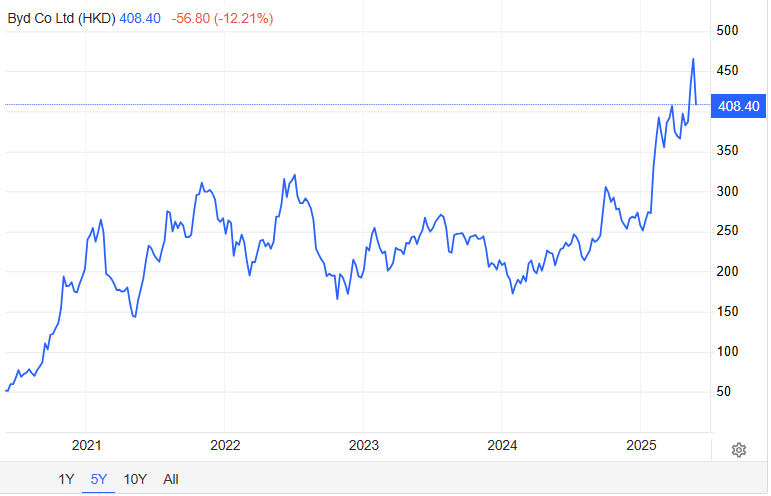Warning on risks: Financial contracts for difference are complex instruments and are associated with a high risk of rapid financial losses due to leverage. On 76.44% of retail investor accounts, financial losses occur when trading financial contracts for difference with this provider. You should consider whether you understand how financial contracts for difference work, and whether you can afford to take the high risk of suffering financial losses. Please read the Risk Disclosures.

.jpg)
The price war in China’s car industry, led by BYD, threatens the entire market
BYD, Tesla’s Main Competitor
BYD has become Tesla's biggest global competitor in the electric car segment, overtaking Tesla in battery car sales in Europe for the first time in April 2025 (7,231 vs. 7,165 units). This turning point came thanks to a sharp increase in BYD sales (+169% year-on-year), while Tesla registrations fell by 49%.[1][2] BYD is also catching up with Tesla in sales worldwide. In the first quarter of 2025, it even sold more battery cars than Tesla (416 thousand vs. 336 thousand). With aggressive pricing, technological innovation, and government support, BYD is quickly becoming a leader in the fight for the throne in the electric car market.[3]
Price war on the horizon
However, we often hear about Chinese electric car giants like BYD, but few people realize that most brands in this industry are barely surviving. More than half of China's nearly 170 automakers have a market share of less than 0.1%. The market is overcrowded, the price war has been going on for three years and the weaker players simply cannot handle it. At the same time, BYD has just spun the spiral again. The price of the cheapest Seagull model fell below CNY 56,000 (about $7,765), which is a sharp drop from the almost $10,000 price tag from a few weeks ago.[4] Rebates in this range have the potential to seriously harm the entire market, as well as BYD itself. The first reactions of the competition have already arrived. Carmakers are undermining their own profitability with low prices. The result could be pressure on margins, which are already low in this sector. While electric cars are growing in popularity, costs are also rising – especially those related to batteries and disrupted supply chains.[5]
The state as support and risk
In addition to radical discounts, the Chinese government's extensive incentives are not helping, as it has introduced new scrappage fees, up to CNY 15,000 ($2,080) for electric cars and up to CNY 13,000 ($1,800) for gasoline models. The country logically wants to accelerate the transition to cleaner cars, but at the same time it means another source of competitive pressure. Companies are fighting not only among themselves, but also for the favor of customers, who are motivated by the price reduction.[6] It should be remembered that in the past, BYD and other brands have suffered when state subsidies for electric cars have fallen. That is why BYD has tried to diversify and expand abroad in recent years, but the domestic market is still crucial.[7][8]
BYD share price has long-term support in robust economic results
Despite the potential damage that a price war can cause, BYD is still showing strong growth. For the Q1 of 2025, its sales increased by 36.35% year-on-year and profit after tax by as much as 100.38%, mainly due to record vehicle sales and global expansion. Consensus market expectations for the Q2 of 2025 are for earnings per share (EPS) of $0.48, while estimates for the full year are at $2.33.
BYD shares on the Hong Kong Stock Exchange (HKG) are experiencing volatility due to the aggressive discounts, but the company's fundamentals are solid. The share price has already risen by more than 60% this year. On Tuesday, May 27, they closed at nearly HKD 420 ($53.62), reflecting investor confidence despite the recent volatility caused by the aforementioned discounts.* With continued selling momentum, improving margins and solid financial fundamentals, BYD is well-positioned for sustainable growth in the medium and long term. [1][9][10]

BYD stock price performance over the past 5 years. Source: tradingeconomics.com*
Conclusion
BYD may be able to revive sales at the moment, but it is doing so at the cost of market stability. Too much inventory, weaker growth and a combination of government and corporate incentives create a combination of factors that can further deepen the price war. Although some companies can afford it, many smaller ones get into existential problems. China's quest for leadership in electromobility thus finds itself in a paradoxical situation – volume may grow, but profits and stability are declining. A sell-off can solve the problem today. But it can create a bigger problem tomorrow. [2]
* Past performance is not a guarantee of future results.
[1,2] Forward-looking statements are based on assumptions and current expectations, which may be inaccurate, or on the current economic environment, which is subject to change. Such statements are not a guarantee of future performance. They involve risks and other uncertainties that are difficult to predict. Results could differ materially from those expressed or implied in any forward-looking statements.
[1] https://cnevpost.com/2025/05/22/byd-surpasses-tesla-bev-europe/
[2] https://www.nytimes.com/2025/05/22/business/china-byd-tesla-sales-ev-europe.html
[3] https://techresearchonline.com/blog/tesla-vs-byd-the-global-ev-race/
[4] https://www.investing.com/news/stock-market-news/analysischina-auto-market-price-war-stokes-fears-of-industry-shakeout-4066080
[5] https://cnevpost.com/2025/05/26/byd-shares-fall-after-price-discounts/
[6] https://www.autocango.com/news-detail/china-2025-auto-trade-in-subsidies?page=news
[7] https://electrek.co/2017/05/08/byd-electric-vehicle-sales-drop-china/
[8] https://jp.reuters.com/article/us-byd-results/chinas-byd-warns-profit-to-plunge-on-electric-car-subsidy-cuts-shares-tumble-idUSKBN1H31PP/
[9] https://capital.com/en-eu/analysis/byd-stock-forecast-what-is-next-for-the-chinese-ev-maker
[10] https://www.investing.com/news/analyst-ratings/ubs-lifts-byd-stock-price-target-to-hk540-on-sales-outlook-93CH-4062910